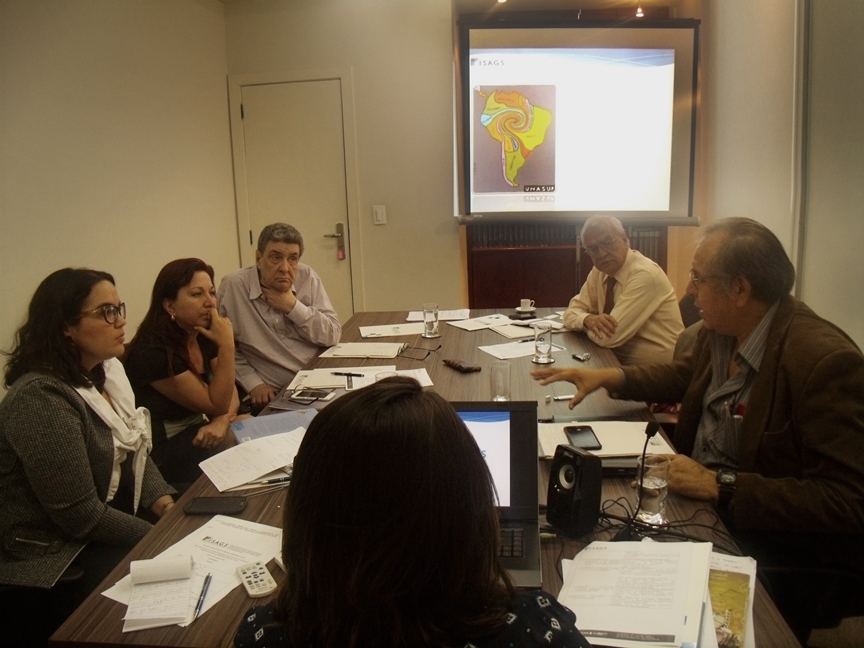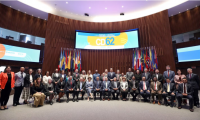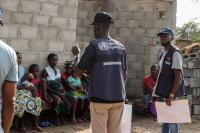ISAGS workshop seek cooperation in border health

Experts from international organisms and members of ISAGS concluded on 14 August, the preparatory meeting for the workshop "Border health policies in UNASUR”. The event will be held on October 27, 28 and 29 at the headquarters of the Institute in Rio de Janeiro, and its objective is to outline an international, subregional and intersectoral overview of health care in border areas through an exchange of experiences. The aim is to understand the political, economic and social mechanisms at national and local levels in order to point out challenges and formulate recommendations.
The debate is under the framework of ISAGS’ Annual Operating Plan 2015 and it represents a great progress for the South American region. According to the collocations made by the experts, the border areas of the bloc currently face a lack of funding, basic sanitation and quality health provision, besides other problems that devastate the region, such as the smuggling of humans, drugs and weapons, the prostitution of children and the dissemination of communicable diseases among indigenous populations.
Beyond the analysis about the current status of borders, the attendants also defined the objectives and expected outcomes, the transversal axes for the subregional presentations and the workshop’s draft agenda. The participants also took the opportunity to agree upon the creation of guidelines that will function as a roadmap for participants, with information about the place of the event and instructions for presentations.
ISAGS, ORAS-CONHU, MERCOSUR and ACTO
On the first day (13) of the meeting, ISAGS’ technical coordinator, Henri Jouval, presented the preliminary proposals for the workshop and highlighted the importance of understanding the countries’ experiences in border areas. Jouval stated that the aim is "to listen to what each region has to say". Throughout the meeting, the consultant of the Andean Health Organism (ORAS- CONHU), Luis Beingolea More, talked about the Andean cross-border experiences and presented the achievements and the development process of the Andean Health Plan. Beingolea mentioned that he hopes that this initiative becomes universal. “We believe that we must share the progresses achieved in the Andean region with UNASUR countries […] to ensure that there is no distinction between nationalities in South American borders”, he said.
MERCOSUR’s representative for the meeting, general director of International Relations of the Public health Ministry and Welfare of Paraguay, Maria Antonieta Gamarra congratulated Beingolea for the plan and remarked that this is the type of experience she hopes to see during the event. “As a participant of the workshop, my expectations are to see the sort of thing that has been shown to you [Andean Health Plan]. What I hope to see are definitions of the next steps, how to progress, strategies", and exalted that it is necessary to keep record of everything that will be discussed. “There must be a document and it must show what to do and how to do it”.
The health coordinator of the Amazon Cooperation Treaty Organization (ACTO), Antonio Restrepo, exalted ISAGS’ debate initiative and said that this is an opportunity to manage international cooperation programs that can favor two or three countries in the case of borders and to bring nations closer in order to enable a shared vision of their border issues. To him, the participation of the European Union will be essential in this context. “They (EU) have an extremely wide experience in the field and they will tell us their experiences, how they managed to harmonize national policies and employ cross-border health plans", he stated.
Besides the aforementioned organisms, the event will count with the international participation of the European Union and the Pan American Health Organization (PAHO), as well as subregional institutions such as the Caribbean Community (CARICOM).
ISAGS international affairs coordinator, Mariana Faria, and the Institute’s consultant, Suelen de Oliveira, also attended the meeting



